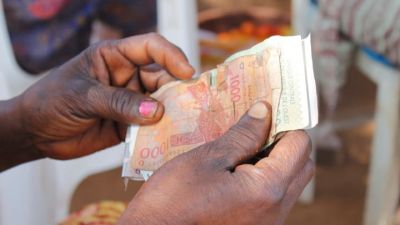The arrival of West Africa’s new flagship common currency, eco, could now be up to five years away after being derailed by the coronavirus pandemic, Ivorian President Alassane Ouattara announced.
Leaders of the eight countries of the West African Economic and Monetary Union (WAEMU) and the broader 15-member Economic Community of West African States (ECOWAS) had hoped that the replacement for the French colonial CFA franc would be in place by the end of this year.
The agreed criteria among WAEMU members for the currency’s launch was for national budget deficits to be contained at or below 3% of GDP (gross domestic product).
However, Ouattara told journalists in the city of Bouafle on Saturday that in light of the economic hit from Covid-19 pandemic, he does not foresee this being achievable within the next few years and therefore does not expect the eco to be implemented for another three to five years, according to Reuters.
IMF projects that the Sub-Saharan African economy will contract by 3.2% in 2020, its worst decline on record.
CFA franc, comprising both the Central African XAF and the West African XOF, is currently pegged to the euro at CFA 655.96. The arrival of Covid-19 crisis and the associated drop in commodity prices placed the currency under pressure, as uncertainty arose over whether the respective central banks (Bank of Central African States and the Central Bank of West African States) could sustain the peg.
A slowing down of the pandemic and the French Treasury guaranteeing the peg eased the pressure somewhat in May, and currency stability broadly helped mitigate the economic hit to the region at the height of the crisis, according to NKC African Economics, with inflation expected to remain relatively muted despite external pressures.
However, NKC economist Leeuwner Esterhuysen suggested that the threat of a second wave of infections, particularly in Europe, could place the currency under further pressure this year.
“Adopting a new, independent currency could reduce the region’s reliance on monetary developments in Europe but may bring on a whole new set of problems,” Esterhuysen said in a note Monday.
“There are concerns that Nigeria would dominate developments in FX markets with its heavy reliance on oil potentially adding undue currency risk, while certain regional economic convergence criteria set out for the currency also seem unattainable due to heterogeneity among member economies.”
Esterhuysen anticipated that as a result, the planned replacement of CFA franc with the eco will need further refinement in the coming years before it can be successfully implemented.
“That said, West African governments’ short-term focus will be on reducing spending and widening tax bases in order to rein in budget deficits as the introduction of the new regional currency is put on hold for now,” he concluded, projecting that the current CFA franc and its existing euro peg would remain in place for the foreseeable future.
CNBC

